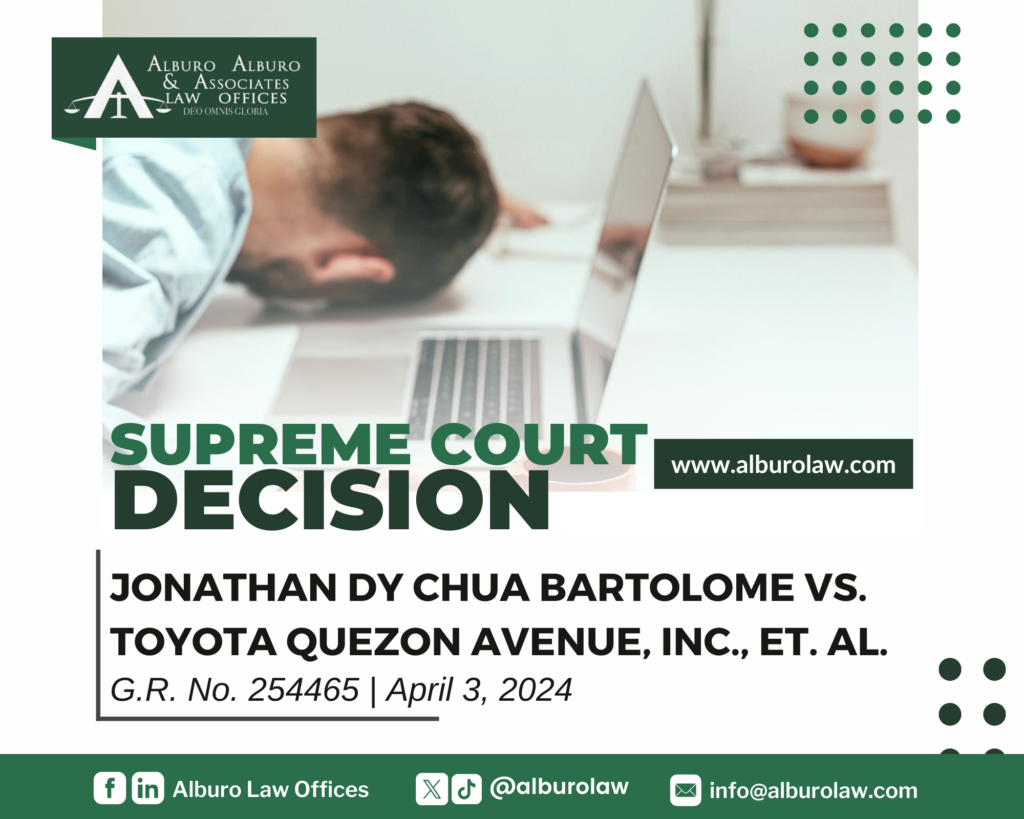
Photo from Pexels | Cup of Couple
The following post does not create a lawyer-client relationship between Alburo Alburo and Associates Law Offices (or any of its lawyers) and the reader. It is still best for you to engage the services of a lawyer or you may directly contact and consult Alburo Alburo and Associates Law Offices to address your specific legal concerns, if there is any.
Also, the matters contained in the following were written in accordance with the law, rules, and jurisprudence prevailing at the time of writing and posting, and do not include any future developments on the subject matter under discussion.
AT A GLANCE:
In the case of Bartolome vs. Toyota Quezon Avenue Inc., et al., G.R. No. 254465, April 3, 2024, the Supreme Court has held that demotion, verbal abuse, and indifferent behavior by an employer that forces an employee to resign constitute constructive dismissal.
FACTS:
Bartolome became a regular employee of Toyota Quezon Avenue, Inc. (TQAI) in 2010, tasked with selling Toyota cars, products, and services. During his employment, he faced hostility from the company’s senior management.
In 2015, Bartolome was suspended for seven (7) days due to frequent absences. During a meeting with TQAI’s management, Bartolome’s sibling, acting as his legal counsel, accompanied him. The President of TQAI then publicly humiliated Bartolome for bringing his sibling to the meeting.
Bartolome was transferred to another team, and many of his accounts were taken away without explanation. TQAI’s general sales manager turned down his attempt to process a sale, and his new boss explicitly asked if he planned on resigning.
Due to these events and the hostile work environment, Bartolome resigned in 2016. When he tried to get his clearance, he was treated like a stranger-criminal and harassed for no reason.
Bartolome later filed a complaint with the Labor Arbiter (LA) against TQAI and its officials for constructive dismissal and money claims.
The LA ruled that Bartolome was constructively dismissed. It held that the circumstances leading to his transfer to another team largely contributed to his resignation. The National Labor Relations Commission (NLRC) affirmed the LA’s decision.
The CA ruled in TQAI’s favor, finding that Bartolome voluntarily resigned and failed to prove his resignation resulted from coercion and intimidation.
ISSUE: Whether or not Bartolome was constructively dismissed.
RULING:
Bartolome was constructively dismissed. The Supreme Court emphasized in its ruling that actions demonstrating extreme dislike and hostile behavior, such as demotion, uttering insulting words, and apathetic behavior toward an employee, constitute constructive illegal dismissal when such actions cause the employment conditions to be so unbearable that there is no other choice but to resign.
The Court held that the standard for constructive dismissal is whether a reasonable person in the employee’s position would have felt forced to give up their employment under the circumstances.
While the Court said that strong words may be exchanged in the workplace where there are bound to be disagreements, these should not degrade the dignity of employees to avoid a hostile work environment.
The Court found that the actions of TQAI’s senior officials towards Bartolome demonstrated extreme dislike and hostile behavior. These actions collectively indicated that they were pushing Bartolome out, leaving him with no choice but to resign from his employment.
Bartolome would not have intended to resign from the company without TQAI officials’ hostile actions.
TQAI, together with its officials, was ordered by the Court to pay Bartolome full backwages, separation pay, earned commissions, moral and exemplary damages, and attorney’s fees
SOURCE:
Jonathan Dy Chua Bartolome vs. Toyota Quezon Avenue, Inc., et. al.
G.R. No. 254465 | April 3, 2024
Click here to subscribe to our newsletter
Alburo Alburo and Associates Law Offices specializes in business law and labor law consulting. For inquiries regarding legal services, you may reach us at info@alburolaw.com, or dial us at (02)7745-4391/ 0917-5772207/ 09778050020.
All rights reserved.


